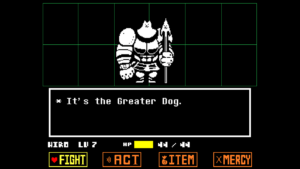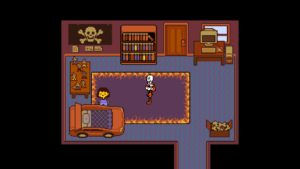★★★★★★★★★✰
[9/10 stars]
I had always wanted to play Undertale after hearing so much about it and seeing the amazing fanart from the fanbase. With this week’s RWP game, I was able to finally sit down and give the game a shot. While I had heard of the game, I didn’t know much about how to play or the characters. So, this first run of the game was played without any biases to which playstyle was best.
When you first launch the game, you are greeted with a short story that sets up the plot of the game. A lost child who has fallen underground. As a human player, your goal is to escape and return to the surface. You are first introduced to an evil plant monster, who tries to trick you and question your morals. The start of this game leads you to be wary of future monsters. In contrast, an NPC frog tells you to give mercy to monsters, and urges you to not kill them. On one end, killing monsters yields more gold and experience, and on the other, playing like a pacifist allows you to build better connections with monsters. As I played, I was suspicious of any and all characters, even Toriel, the motherly goat figure. I thought to myself, “Why does she have a box of different children’s shoe sizes?” or “Why won’t she let me see the basement?” Despite my suspicions, Toriel ends up being a kind-hearted figure that just wants to look out for you. During my fight with her, she even avoided shooting her abilities at me. Unfortunately, I killed her as I thought I couldn’t get out of the basement if I didn’t. I continued to play the game with Toriel dead, but felt guilty as I tried to use the phone item with no response from Toriel. This guilt is a good example of how Undertale utilizes procedural rhetoric to question the ethics behind killing in RPGs.

[interacting with a greater dog monster; yes… I killed it…]
With Toriel’s death and her adamancy against Frisk leaving, I thought, how can a player win peacefully if there are dangerous things out there? If no other human made it to the surface, does that imply that players must protect themselves with force if necessary? The storytelling of Undertale was amazing in this sense. There were subtle hints spread across the interactable NPCs, objects, and signs. The characters and cut scenes foreshadowed the dangers of trekking through the underground world. It made you really question if you should kill the next monster or try to “rizz” it up.
As I ventured through different settings in Undertale, another aspect about the game that sparked my interest was the music. The music is masterfully used to create mood and tone throughout the game. While I did not get to the point in my genocide run where all the music disappears (I read spoilers about this happening later on), one thing I noticed is that the music stays happy and upbeat after you do a good thing. For example, after I became friends with Papyrus and visited his house, the music is energetic. It’s fitting for a wholesome scene, where Papyrus eagerly gives a house tour. In scenes where you’re exploring a new place, the music can be eerie. It makes you feel untrustworthy of what is to come next. In Undertale, the art and music are tools used to build an immersive world, a tool to create suspense.

[visiting Papyrus’ cute room]
At its core, Undertale is a unique RPG-style game that gives you options based on your own ethics. You can win without any violence. You can win by killing any and everything you meet. At the end of the day, your moral compass will be assessed as you face the consequences of your actions. As Bogost says in The Rhetoric of Video Games, “games have the power to make arguments, to persuade, to express ideas” (Bogost, 2008). Undertale is a game that does exactly this through its assessment of the ethics behind RPGs. Unlike other typical RPG games, where the player is expected to kill mobs for monetary gains and experience to progress, Undertale gives agency to its player.



You mentioned how “At its core, Undertale is a unique RPG-style game that gives you options based on your own ethics.” But I think that games can also be a place for us to explore our ethics, and not necessarily fully represent them because of the abstraction of violence that occurs in video games. However, I think that it’s interesting to point out what is the role of ethics in game play and how we reinforce different values in the game.
I completely forgot about the fact that supposedly no other humans had ever made it to the surface before. This complicates the whole pacifict vs violence thing. Did the humans in the past fail to make it out alive becaues they chose violence? Or because they were not violent enough? Learning that other humans didn’t make it out alive definitely does not encourage the player to be peaceful and just wait to find out if this strategy will end up killing them or not.
Hi Ngoc, I also wasn’t really familiar with Undertale before I played it. I liked your point that Undertale captivates its player through the music and also the bending of the RPG genre. It gives the players agency that isn’t just violent and allows the players to choose how they want to play the game.